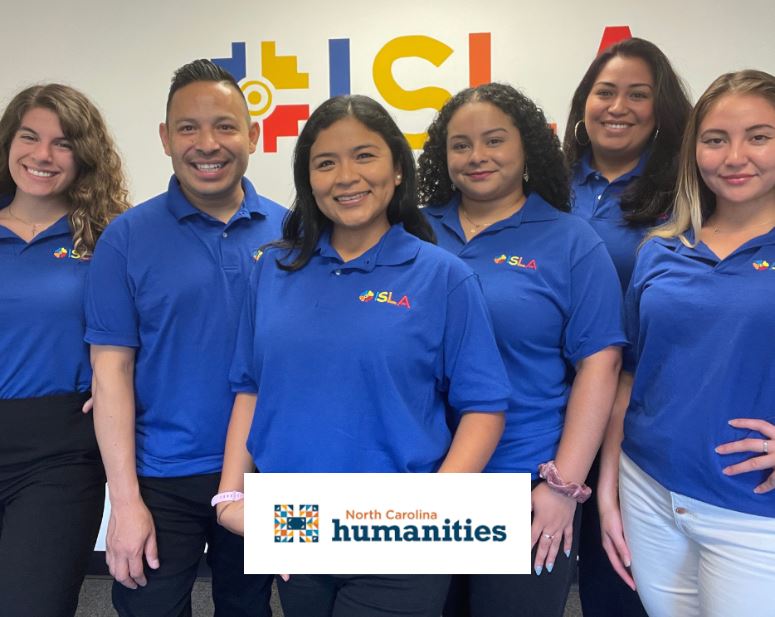Language is a powerful tool. It’s not just how we primarily communicate with others, it also influences how we interact with others and is an important piece of our individual identity. At Immersion for Spanish Language Acquisition (ISLA), language is used to foster a sense of belonging, strengthen community, and promote Latino leadership. ISLA believes that supporting the use of heritage language, or a language learned at home, is particularly important for children and grandchildren of immigrants to connect them culturally and linguistically to their ancestors and family history.
In 2022 and 2023, ISLA received project grant funding from North Carolina Humanities to support their ISLA Los Sábados weekend programming. Using an interdisciplinary learning approach, ISLA Los Sábados aims to close the opportunity gap and open doors for Hispanic/Latino youth and their families.
We connected with Lucinda Smith, Grants Development Manager at ISLA, to learn more about why keeping culture alive across generations is important and how language immersion can create belonging and strengthen cultural ties from a young age.
How did ISLA begin?
Lucinda: ISLA is an educational nonprofit organization that builds community and leadership through heritage language and cultural immersion programs. Heritage language is essentially a language that is learned at home or through familial connections, typically not learned in a formal educational setting. ISLA was founded by a mother whose children were born multiculturally and raised multilingually. Her husband was from Peru, and she was a fluent Spanish speaker from the U.S. She thought it was important for her children to learn Spanish to maintain a connection to their roots. As she met other parents who were also teaching heritage languages at home, she thought about the benefits of forming a community where families and children would be supported in their diverse cultural upbringing and where they could feel connected to one another.
Who attends ISLA Los Sábados?
Lucinda: The school is in Chapel Hill at St. Thomas Moore and many of the families we serve are from Wake County, Durham, and Chapel Hill who are either first- or second-generation immigrants. We have about 200 students currently enrolled. The program is offered at no cost to families. The retention rate from year to year is close to 95%. Almost everybody comes back and moves up through the program. When ISLA first started more than 10 years ago, there was a core group of 12 kids, and those 12 kids are now in high school! Some of them are starting to apply for college and many will be the first in their family to go to college. It feels like a full circle moment witnessing the effects of ISLA Los Sábados over this duration of time.
What does a typical day in an ISLA Los Sábados classroom look like?

Lucinda: We offer our ISLA Los Sábados program as a 3-hour class on Saturdays from October through May. ISLA Los Sábados means ISLA on Saturdays in English. In these classes, kids are fully immersed in Spanish, and we’re teaching and reinforcing the language through culture. Every year we ask the parents and students what they are interested in and how they like to learn. We use a culturally-responsive and multidisciplinary approach. Sometimes we’re listening to music, other times we’re reading. Each teacher creates a unique lesson plan based on their class; they really put their heart and soul into it. We also have an amazing staff, particularly our leadership team and two executive directors, Jose Cordova and Susana Benites. One unique thing about ISLA Los Sábados is snack time, which we call Tiempo Cultural, or ‘cultural time’. We ask a child’s family member to do a presentation of their culture during Tiempo Cultural. Some parents bring a traditional dish like pupusas or empanadas. Others use that time to share a game, read a book, or lead an activity from their country of origin.
What other programs are offered at ISLA?
Lucinda: We have four core programs. The first, our flagship program, is ISLA Los Sábados. Our second program naturally developed because parents would drop their kids off on Saturdays and instead of driving back home, some would just wait until classes were out. We saw that parents were developing friendships and talking amongst themselves about their experiences raising their children in the US, so we decided to offer ISLA Padres. We set up workshops to address questions that parents had about living here in the United States like how to set up a bank account, how to apply for citizenship, and even how to advocate for your child’s education during events like parent/teacher conferences. We also offer ISLA Verano, which is our dual language summer camp program, and Spanish Online, which is a one-on-one class where children converse with a fluent native Spanish speaker to practice their conversational skills. We are working to offer Spanish Online in several public schools in Durham.
What was your experience like working with North Carolina Humanities?
Lucinda: North Carolina Humanities has been great to work with. Many funding opportunities for educational organizations like ISLA can be nuanced and because what we offer is so unique, it can be hard to find the right fit. We’ve enjoyed working with NC Humanities because you all value language and culture and understand that it’s important to create a safe space where people feel they belong. The first year we received funding from NC Humanities was just before our 10-year anniversary when a lot of changes were occurring. It felt like a lot to take on, but NC Humanities helped provide support so we could get through them and thrive. To receive funding a second time this year and be able to build off the work we did is incredible. It helps us look to the future, so we cannot just sustain ourselves, but really grow and expand.
How can people support ISLA?
Lucinda: Donations help us immensely. We have a membership platform called MAS ISLA (Maintain And Sustain ISLA), and we send out newsletters and articles about the work we’re doing. We also have several public events throughout the year. We hope everybody feels welcome and invited to be a part of the ISLA community. Visit https://www.laislaschool.org/donate/ for more information!
About North Carolina Humanities’ Grantee Spotlights: NC Humanities’ Grantee Spotlights shine a light on the incredible work of our grantee partners, offering details about their funded project, and feature a Q&A with a team member(s) associated with the organization. This interview has been edited for length and clarity.


